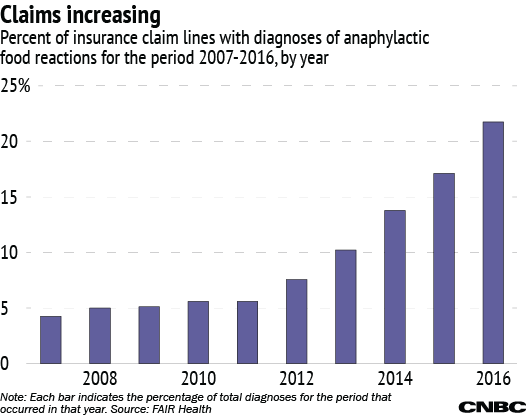Throughout my childhood up until high school, my mom would prepare a peanut butter and jelly sandwich for me for lunch everyday. If it wasn't peanut butter and jelly, I just simply would not eat it.
 |
| Peanut Butter and Jelly Sandwich |
Peanut butter and jelly sandwiches are a popular choice for children's lunch; however, for some children in America, this tasty snack could cause an itchy throat or even a trip to the hospital. Unlike me, my younger sister has a deathly food allergy to peanut butter and shellfish; while I was eating my PBn'J sandwich for lunch, she would be eating her favorite, Chef Boyardee ravioli (ew!). Due to food allergies there are children all over the world that have to avoid certain everyday foods such as milk, eggs, shellfish, and worst of all peanut butter! Food allergies are most common in children, but beware... they can develop at any age, so be more cautious next time you are preparing that PBn'J for lunch.
 |
| Allergy Meme |
Why is it that we can enjoy our favorite food one day and suddenly develop a deathly allergy to it the next? You can thank your immune system for that one because although it is our bodies' way of defending us from harm, it can sometimes overreact by attacking harmless substances also known as allergens. Scientists believe immunoglobulin E was initially developed by the human body as protection from parasites but at times it can confuse certain foods for a pathogen. For instance, if someone is allergic to peanut butter and they consume it, it will send a signal to their immune system that will trigger the release of antibodies called
immunoglobulin E (IgE). These immunoglobulin E antibodies travel from cell to cell in your body which causes a release of chemicals that permit an allergic reaction such as coughing or itchy skin. There are different types of Immunoglobulin E antibodies with individual "radars" for different allergens. Some people may be allergic to several kinds of foods, because they have
multiple types of the the IgE antibodies, while other people may be allergic to just one food.
Food allergies can manifest a wide range of symptoms such as swelling of the throat, hives, nausea and vomiting; symptoms may persist even after the resolution of the major allergy attack. Anaphylaxis is an extreme symptom that many people with nut allergies have, usually occurring within minutes or hours of contact with an allergen causing a contraction of the air ways and a drop in blood pressure and may cause death.
 |
| Signs of Anaphylaxis |
There are different factors that determine whether or not you will have a food allergy such as
the degree of exposure to food, molecular characteristics of the allergen, and
genetic predisposition of an individual. Often times if parents have some type of allergy, children are more likely to have them. If you are aware that you have a food allergy, at some point, you will probably be exposed to what you are allergic to, so it is important to be prepared whenever you are surrounded by food or in a foreign
setting.
Food Allergies on the Rise
It is always important to have good hygiene, right? Think again. Scientists have developed a few theories as to why allergies are becoming more and more common amongst children. The 'hygiene hypothesis' is the idea that a lack of exposure to infectious agents early in childhood can make it more likely for the immune system to mistake a food as a pathogen. This potentially links to the Western Society's obsession with fighting off germs, creating allergies for ourselves. Researchers are also observing what a pregnant mother eats during the different cycles of her trimester and how it affects the baby; they believe what a fetus is exposed to, while in utero, will have a big influence on its childhood. Further research into these ideas could explain why the prevalence of food allergies, from 1997 to 2011, has increased in children by 50%.
 |
| This diagram shows the drastic increase overtime of food allergies that could lead to anaphylactic shock |
Prevention of Anaphylaxis
The first line of treatment for anaphylaxis is Epinephrine (adrenaline), by reversing swelling in the airway and raising low blood pressure, it works to reverse the life-threatening symptoms. Doctors often prescribe Epinephrine to people with severe allergies in the form of an EpiPen and it is recommended for use as soon as you have eaten something you know you are allergic to or feel any symptoms of an allergic reaction. EpiPens are a quick solution to prevent anaphylactic shock and unlike other medications, such as antihistamines, it could save your life.
Recently scientists have also been trying to prevent deathly food allergies by introducing children to the more common food allergens. By being introduced to potential allergens at
earlier ages, children may develop protection from a severe food allergy since their immune system has been exposed to the allergen early on.
 |
| Epinephrine Auto-Injector |
\





No comments:
Post a Comment